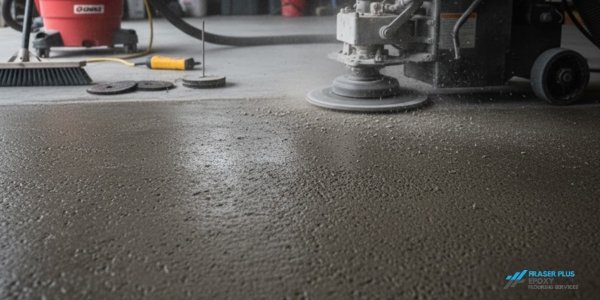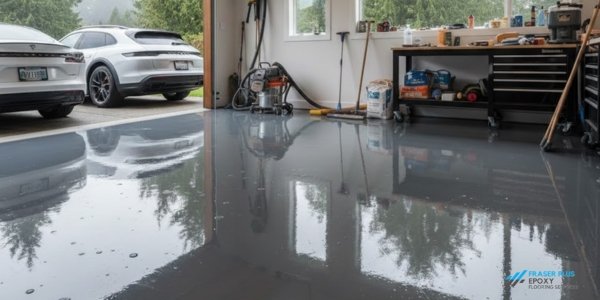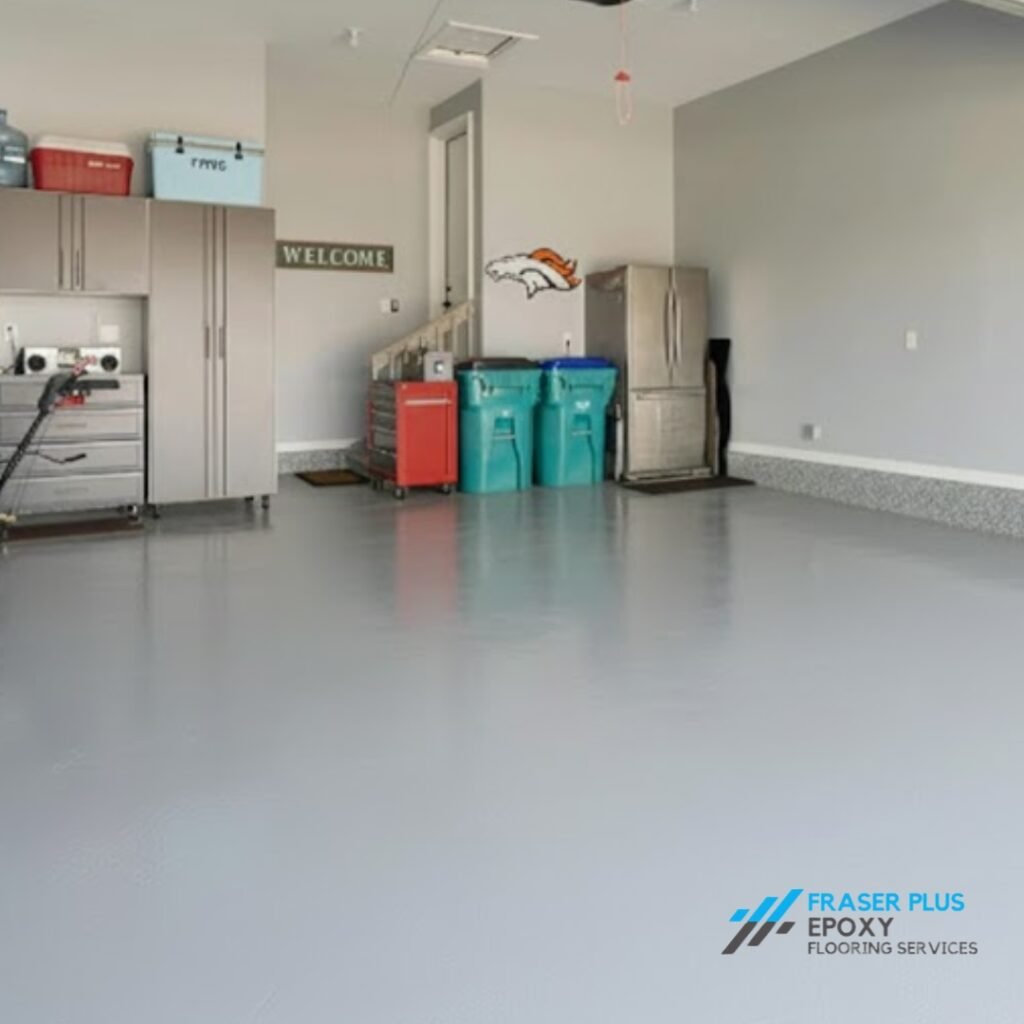Avoid These Common Mistakes That Cost Homeowners Thousands in Repairs of Epoxy Flooring Vancouver
The Peeling Nightmare: Why Surface Preparation Makes or Breaks Your Floor
The most devastating—and most common—regret Vancouver homeowners experience with epoxy flooring is delamination, where the coating literally peels away from the concrete like old paint. This catastrophic failure occurs in over 75% of problem installations and can be traced back to a single, preventable cause: inadequate surface preparation. What makes this particularly heartbreaking is that the warning signs often don’t appear until months after installation, when it’s too late and too expensive to fix properly.
Here’s what actually happens beneath your beautiful new floor: Epoxy forms a chemical bond with concrete at the microscopic level, but this bond requires a perfectly clean, properly textured surface. Even invisible contaminants—oil stains that seem cleaned, concrete dust, moisture residue, or previous sealers—create a barrier that prevents true adhesion. Think of it like trying to glue two pieces of wood together with a thin layer of soap between them: it might hold temporarily, but it’s destined to fail under stress.
Vancouver’s garage floors are particularly susceptible to preparation failures. Years of car oil, road salt, and cleaning chemicals penetrate deep into concrete pores, creating contamination that standard cleaning methods simply can’t remove. A West Vancouver homeowner recently discovered this the hard way when their beautiful metallic epoxy floor began peeling in large sheets just eight months after a $8,000 installation. The contractor had skipped professional degreasing and mechanical surface preparation, leaving invisible oil residues that prevented proper bonding.
Professional surface preparation involves diamond grinding or shot blasting to create the proper surface profile—a controlled roughness measured in mils that provides maximum mechanical and chemical adhesion. This isn’t just cleaning; it’s literally reshaping the concrete surface to optimize epoxy bonding. The process removes all contaminants, opens concrete pores, and creates the textured surface that transforms a marginal installation into a decades-long success.
The cost difference between proper and inadequate preparation is shocking. Professional diamond grinding adds approximately $2-4 per square foot to installation costs, but prevents failures that cost $8-12 per square foot to remediate. One Richmond family learned this lesson after their DIY epoxy floor failed completely: the removal, concrete repair, and professional reinstallation cost nearly three times their original budget, plus months of disruption and stress.
Modern moisture detection technology has revealed another layer of preparation complexity: concrete that appears dry can still emit dangerous levels of moisture vapor that destroy epoxy adhesion over time. Professional installers now use electronic moisture meters and calcium chloride tests to verify that concrete moisture levels are below the critical threshold before coating application—a step that’s almost never performed in DIY installations.
A comprehensive study on moisture vapor emission and coatings can be found at the Portland Cement Association, which details concrete moisture issues globally relevant to epoxy flooring.
Vancouver’s Humidity Trap: Why Moisture Testing Isn’t Optional
Vancouver’s coastal climate creates a perfect storm for epoxy flooring failures through a phenomenon most homeowners have never heard of: moisture vapor emission (MVE). This invisible enemy rises from within concrete slabs, creating hydrostatic pressure that literally pushes epoxy coatings off the surface months or years after installation. Understanding and managing moisture has become the dividing line between successful, long-lasting epoxy floors and expensive failures that leave homeowners searching for explanations.
The science behind moisture-related failures is straightforward but devastating: concrete naturally absorbs moisture from the ground, air, and internal sources, which then migrates toward the surface through capillary action. When non-permeable epoxy is applied over concrete emitting more than 4 pounds of moisture per 1,000 square feet per 24 hours, the trapped moisture creates pressure that manifests as bubbling, blistering, and eventual delamination. Vancouver’s year-round humidity and seasonal rain patterns make this testing absolutely critical.
The timing of moisture problems makes them particularly insidious. A Burnaby homeowner’s garage floor looked perfect for 18 months before mysterious bubbles began appearing near one wall. Professional testing revealed that a minor foundation settling issue had created a pathway for moisture infiltration that overwhelmed the epoxy’s adhesion. By the time visible symptoms appeared, water damage had compromised nearly 30% of the installation, requiring complete removal and reinstallation with proper moisture mitigation systems.
Modern moisture testing involves multiple techniques that professional installers use to verify safe conditions: Electronic relative humidity probes measure moisture at different depths within concrete slabs, while calcium chloride tests quantify actual vapor emission rates over 72-hour periods. These tests often reveal surprising results—concrete that appears completely dry on the surface may be emitting dangerous moisture levels that guarantee epoxy failure.
Vancouver’s seasonal moisture variations make timing crucial. Concrete that tests safe during winter dry periods may exceed safe emission levels during spring snowmelt and summer humidity spikes. Professional contractors now perform moisture testing during worst-case seasonal conditions and install vapor barrier systems when emission rates approach borderline levels, ensuring long-term performance regardless of weather patterns.
The investment in proper moisture testing pays massive dividends. At approximately $300-500 for comprehensive testing on a typical garage, this represents less than 5% of total project costs while preventing failures that require complete reinstallation. One Coquitlam family avoided a $15,000 disaster when moisture testing revealed dangerous emission levels that required vapor barrier installation—an additional $1,200 investment that saved their entire project from certain failure.
The DIY Disaster: Why Home Store Kits Fail in Vancouver’s Climate

The promise seems irresistible: transform your garage floor into a showroom-quality surface for a few hundred dollars and weekend of work. Unfortunately, Vancouver’s challenging climate conditions and the technical requirements of proper epoxy installation make DIY epoxy kits one of the most regretted home improvement purchases. Industry data shows that over 60% of DIY epoxy installations fail within two years, leaving homeowners with damaged concrete, wasted money, and the expensive reality of professional remediation.
The fundamental problem with retail epoxy kits lies in their one-size-fits-all approach to what’s actually a complex chemical process that must be tailored to local conditions. Home store kits typically contain water-based epoxy formulations that cure slowly, remain relatively soft, and lack the chemical resistance needed for Vancouver’s challenging environment. These products might work acceptably in Arizona’s dry climate, but Vancouver’s humidity, temperature fluctuations, and seasonal moisture create conditions where DIY formulations simply cannot perform.
Temperature and humidity control during application represents another critical failure point. DIY installers rarely understand that epoxy curing is highly sensitive to environmental conditions, with ideal application requiring temperatures between 60-80°F and relative humidity below 50%. Vancouver’s weather makes achieving these conditions challenging even during summer months, and nearly impossible during shoulder seasons when many homeowners attempt flooring projects. Poor curing conditions result in soft, chalky surfaces that wear quickly and provide none of the durability benefits that make epoxy flooring attractive.
The surface preparation requirements for DIY kits create another layer of failure. Retail kits typically include basic acid etching solutions that are wholly inadequate for Vancouver’s contaminated garage floors. Acid etching works only on pristine concrete and actually makes adhesion worse on surfaces with oil contamination, previous sealers, or curing compound residues. A Surrey homeowner discovered this after their DIY kit failed spectacularly—the acid etch had created an uneven surface that trapped air bubbles and prevented proper epoxy flow, resulting in a blotchy, poorly adhered coating that began failing within months.
The economic reality of DIY failures is sobering. While the initial kit cost seems attractive at $200-400, failed DIY installations typically require complete removal (often involving expensive diamond grinding), surface repair, and professional reinstallation. The total cost of remediation often exceeds $12-15 per square foot, compared to $8-10 per square foot for professional installation from the start. Factor in the weeks of disruption, physical effort, and frustration, and DIY epoxy becomes one of the most expensive “savings” in home improvement.
Professional contractors bring specialized equipment that makes proper installation possible: commercial dehumidifiers for climate control, diamond grinding equipment for surface preparation, professional-grade moisture testing tools, and high-performance epoxy systems formulated specifically for challenging applications. These tools, combined with years of experience understanding how epoxy behaves in Vancouver’s climate, create the difference between success and expensive failure.
Choosing the Wrong Contractor: Red Flags That Cost You Thousands
Not all epoxy contractors are created equal, and choosing the wrong installer can be more expensive than attempting DIY. Vancouver’s booming construction market has attracted numerous contractors who lack the specialized knowledge and experience necessary for successful epoxy installations. The unfortunate reality is that general contractors, handymen, and even some flooring specialists often underestimate epoxy’s technical requirements, leading to expensive failures that leave homeowners worse off than before they started.
The biggest red flag is contractors who skip moisture testing. Any professional installer who doesn’t mention moisture vapor emission testing, doesn’t own moisture detection equipment, or suggests that moisture testing is unnecessary should be eliminated immediately. This single oversight accounts for more epoxy failures than any other factor, and contractors who don’t understand moisture management fundamentally don’t understand epoxy flooring. A North Vancouver family learned this lesson after their contractor assured them that moisture testing was “just an upsell”—their $12,000 installation failed completely within 14 months due to moisture-related delamination.
Surface preparation shortcuts represent another critical warning sign. Contractors who propose cleaning and acid etching instead of mechanical preparation (diamond grinding or shot blasting) are demonstrating either inexperience or willingness to compromise quality for profit. Proper surface preparation typically requires specialized equipment rental and accounts for 40-50% of professional installation time. Contractors who quote significantly below market rates often achieve these prices by eliminating this critical step.
Material quality varies enormously between contractors. Professional-grade epoxy systems cost $3-5 per square foot in materials alone, while consumer-grade alternatives cost under $1 per square foot. Contractors using cheap materials might offer attractive initial pricing, but the performance difference is dramatic. High-quality industrial epoxy systems provide superior adhesion, chemical resistance, and durability that justify their higher cost through decades of reliable performance.
Warranty terms reveal contractor confidence and expertise. Reputable contractors offer comprehensive warranties covering both materials and workmanship for 5-10 years, while inexperienced installers either offer minimal coverage or exclude adhesion failures entirely. The warranty should specifically cover delamination, cracking, and premature wear—the most common failure modes. Contractors who won’t warrant adhesion don’t understand how to achieve it reliably.
Fraser Plus Epoxy exemplifies the professional approach that prevents these costly regrets. Their systematic preparation protocols, comprehensive moisture testing, premium material systems, and extensive warranty coverage provide Vancouver homeowners with confidence that their investment will deliver decades of satisfaction rather than expensive disappointment. When choosing an epoxy contractor, the quality of their process matters far more than their initial pricing.
Timing Disasters: Why Weather Windows Matter More Than You Think

Vancouver’s climate creates narrow installation windows that can make the difference between success and failure, yet many contractors and homeowners ignore these critical timing considerations. Epoxy installation isn’t just about having a free weekend—it’s about understanding how temperature, humidity, and seasonal conditions affect every aspect of the chemical curing process that determines your floor’s long-term performance.
Humidity levels above 85% prevent proper epoxy curing and can cause surface defects that compromise both appearance and durability. Vancouver’s coastal location means high humidity is common for months at a time, particularly during fall and winter seasons when many homeowners prefer indoor projects. Professional installers use dehumidification equipment to create optimal conditions regardless of outdoor weather, while inexperienced contractors often proceed with installations despite marginal conditions, hoping for the best.
Temperature control affects every aspect of epoxy performance. Too cold, and the chemical reaction slows dramatically, potentially preventing complete curing and leaving surfaces soft and susceptible to damage. Too hot, and the epoxy cures too quickly, creating application difficulties and potential adhesion problems. The ideal temperature range of 60-80°F with stable conditions throughout the multi-day installation process requires careful planning and often climate control equipment.
Seasonal moisture variations create hidden timing challenges. Spring snowmelt and fall rains increase concrete moisture emission rates significantly, making installations that would succeed during summer fail catastrophically during wet seasons. A West Vancouver installation that seemed perfect during October’s installation began showing moisture-related failures the following spring when increased ground moisture overwhelmed the epoxy’s adhesion. Professional contractors now perform seasonal moisture assessments and adjust timing accordingly.
The curing environment must be protected from temperature fluctuations, direct sunlight, and moisture for 72-96 hours after installation. This means maintaining consistent conditions through Vancouver’s unpredictable weather patterns, often requiring temporary climate control systems. Many regret stories trace back to installations that experienced temperature shocks or moisture exposure during critical curing periods, creating permanent performance compromises.
Fraser Plus Epoxy’s climate-controlled approach eliminates weather-related installation risks through comprehensive environmental management systems. Their installations maintain optimal conditions regardless of outdoor weather, ensuring consistent results throughout Vancouver’s challenging climate cycles. This professional approach costs more initially but prevents the devastating failures that occur when installations are rushed or performed under marginal conditions.
Fraser Plus Epoxy: Vancouver’s Solution to Epoxy Flooring Regrets
Fraser Plus Epoxy has built its reputation by understanding and eliminating the exact failure points that cause Vancouver homeowners to regret their epoxy flooring investments. With over a decade of experience specifically in Vancouver’s challenging climate, they’ve developed systematic approaches that address moisture management, surface preparation, material selection, and installation timing to ensure long-term success rather than expensive disappointment.
Their comprehensive preparation process begins with professional moisture testing using calibrated electronic equipment that provides accurate data about concrete conditions before any coating is applied. Diamond grinding surface preparation removes all contaminants and creates the optimal surface profile for maximum adhesion, while specialized cleaning protocols eliminate invisible residues that cause DIY and inexperienced contractor failures.
Premium material systems differentiate Fraser Plus Epoxy from competitors who compromise quality for competitive pricing. They use high-performance industrial epoxy formulations specifically selected for Vancouver’s coastal environment, providing superior moisture resistance, chemical durability, and longevity that justify the investment through decades of reliable performance.
Climate-controlled installation protocols ensure optimal curing conditions regardless of Vancouver’s weather patterns. Portable dehumidification systems, temperature monitoring, and protective barriers create the stable environment necessary for proper epoxy curing, eliminating the weather-related failures that plague installations performed under marginal conditions.
Comprehensive warranty coverage reflects Fraser Plus Epoxy’s confidence in their systematic approach. Their warranties specifically cover the adhesion failures, moisture-related problems, and premature wear that represent the most common regret scenarios, providing homeowners with long-term protection for their investment.
Fraser Plus Epoxy’s track record speaks through hundreds of successful Vancouver installations that continue performing beautifully years after completion. Their systematic approach to preventing the five critical failure points has virtually eliminated the regret scenarios that plague the epoxy flooring industry, establishing them as Vancouver’s most trusted epoxy flooring specialists.
Vancouver Epoxy Flooring
The key to avoiding epoxy flooring regret in Vancouver lies in respecting the region’s unique climate challenges and understanding that not all epoxy floors are created equal. Proper surface preparation, thorough moisture testing, use of premium materials designed for coastal conditions, timing installations within the right weather window, and choosing a contractor with proven local experience are non-negotiable for long-lasting, beautiful epoxy floors. Skipping or shortcutting any of these critical steps invites costly, frustrating failures that can overshadow your initial excitement.
If you’re considering epoxy flooring for your Vancouver home, don’t risk regret. Reach out to Fraser Plus Epoxy today for a consultation, where experienced professionals will guide you through a tailored plan that ensures your flooring investment stands the test of time in Vancouver’s unique climate. Secure your beautiful, durable floor now and enjoy the confidence that comes with having Vancouver’s best on your side.
FAQs
FAQs:
How long does professional epoxy flooring installation take in Vancouver?
Professional epoxy installation typically takes 1-2 days for a standard garage, depending largely on preparation and concrete condition. Larger or custom jobs may require several days for flawless results.Are epoxy floors slippery, and how can that be prevented?
Epoxy floors can be slippery when wet; however, many contractors, including Fraser Plus Epoxy, offer slip-resistant finishes by adding textured aggregates or anti-slip additives to enhance safety without compromising appearance.What maintenance is required for epoxy floors installed by Fraser Plus Epoxy?
Maintaining epoxy floors is easy—regular sweeping and occasional mopping with mild cleaners keep the surface looking fresh and extend its lifespan. Avoid harsh chemicals that can degrade the coating.Can Fraser Plus Epoxy provide a warranty on their flooring installations?
Yes, Fraser Plus Epoxy offers comprehensive warranties covering materials and workmanship for up to 5-10 years, specifically protecting against delamination, moisture issues, and premature wear.Why is moisture testing critical before installing epoxy flooring in Vancouver homes?
Because Vancouver’s high humidity and seasonal moisture variations cause moisture vapor emission from concrete, moisture testing ensures conditions are safe to prevent bubbling, peeling, and costly failures.
People also ask:
What makes epoxy flooring ideal for Vancouver homes despite the climate challenges?
Epoxy is durable, chemical resistant, and water resistant once properly installed, making it ideal for garages and basements where moisture and wear are concerns. The key is having the right installation process tailored to Vancouver’s environment.Can epoxy flooring be installed in outdoor spaces in Vancouver?
While epoxy is typically designed for indoor use, specialized UV-resistant epoxy products can be applied outdoors, but caution is required since exposure to sunlight and weather can affect durability.How does the cost of professional epoxy flooring compare to other flooring types in Vancouver?
Although upfront cost may be higher than some alternatives, epoxy flooring provides long-term savings through durability, low maintenance, and lifespan, resulting in superior value for money.Is it possible to customize epoxy flooring colors and finishes with Fraser Plus Epoxy?
Yes, Fraser Plus Epoxy offers a range of colors, textures, and metallic finishes, allowing homeowners to personalize their floors while maintaining performance and longevity.How soon after installation can the epoxy floor be used?
Typically, epoxy floors require 72-96 hours to fully cure before heavy use, which Fraser Plus Epoxy manages carefully with climate control to ensure optimal curing regardless of weather.
Tags:

